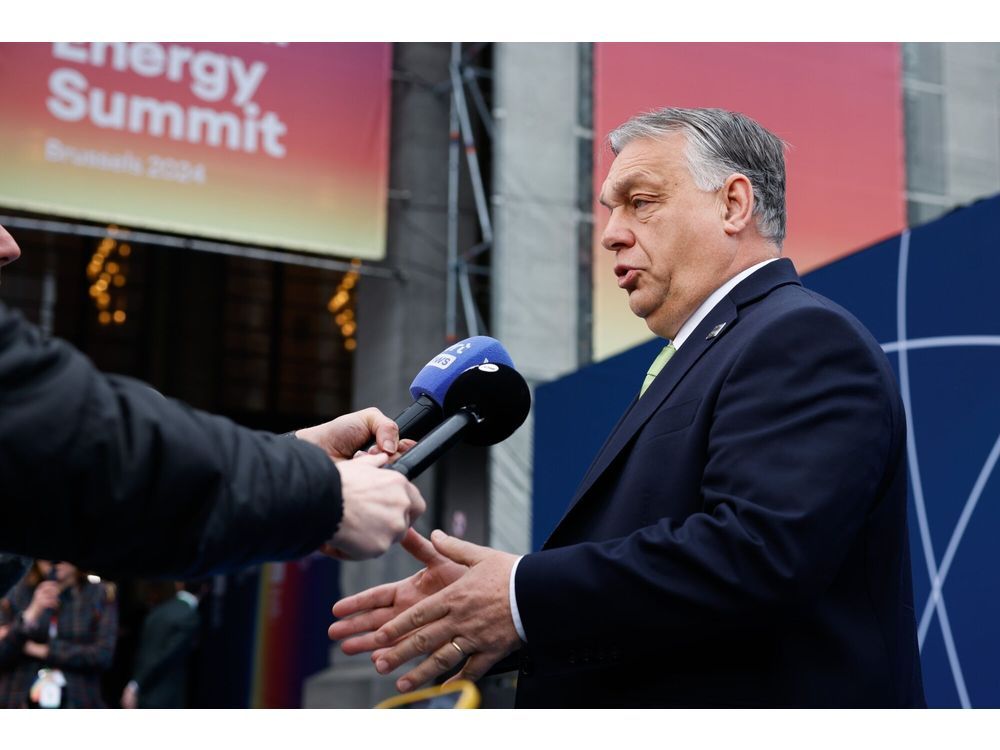
Article content
(Bloomberg) — Hungarian Prime Minister Viktor Orban once again blocked European Union efforts to tweak its Russia sanctions regime, a step needed to unlock significant US participation in a $50 billion loan to Ukraine.
The EU ran into a familiar obstacle as Orban refused to budge during an EU summit in Brussels, according to people familiar with the matter, following through on his promises to delay any decision until after the US election.
Article content
Orban is a strong supporter of Republican nominee Donald Trump, who has criticized US funding for Ukraine and said he will seek a quick deal with Russia, a position that Hungarian leader shares.
The EU is eager to adjust its sanctions to accommodate US demands for a more stable regime that would allow Washington to provide a larger share of the planned loan to Ukraine backed by the profits generated by frozen Russian central bank assets.
Changes to the bloc’s sanctions require unanimity, and for now, Orban’s veto effectively increases the burden on the EU of the Ukraine aid plan. The EU agreed to provide up to €35 billion as part of a plan hatched by the Group of Seven nations.
G-7 nations and the EU committed to provide Ukraine with $50 billion in loans by the end of the year. With Russia making advances on the battleground and another winter approaching, the cash is desperately needed to meet some of Kyiv’s key military and economic funding requirements.
“We need money for this,” Ukrainian President Volodymyr Zelenskiy told reporters in Brussels on Thursday.
The G-7 have collectively frozen about $280 billion of Russian central bank assets, with the vast majority of the funds in Europe, where they are expected to generate about $3 billion to $5 billion in profits a year. The plan was for the EU and the US to provide about $20 billion each, with Canada, Japan and the UK contributing the remainder of the money. The loans would be repaid using the proceeds enabled by the immobilized funds.
Article content
But EU sanctions currently have to be renewed every six months, which US officials have said means they will only be able to provide a smaller contribution because of the risk that the restrictions get lifted long before the loans are paid back. The EU is proposing to extend that term to 36 months, but Orban continues to block the change.
Several leaders raised the issue with Orban at summit on Thursday in Brussels to little avail, one of the people said. Hungary’s position makes no sense as it means the EU having to spend more money, another person said.
The debate came as Zelenskiy was in the Belgian capital to present his proposals to end the war in a way that was acceptable to Ukraine. His “victory plan” includes having NATO extend an invitation to join the alliance, the continued supply of advanced weapons and the ability to use them against military targets in Russia.
“Hungary cannot support this victory plan,” Balazs Orban, a senior aide to Hungary’s prime minister, said on the sidelines of the talks in Brussels. “Part of the plan is to increasingly involve the NATO countries in the conflict. Instead, there should be a strategy pivot, communication should be re-established and peace talks should be started as soon as possible.”
Hungary’s position is out of tune with the rest of the bloc, as EU leaders pledged Thursday in a joint statement to continuing supporting Ukraine “for as long as it takes and as intensively as needed.”
—With assistance from Arne Delfs.
Share this article in your social network